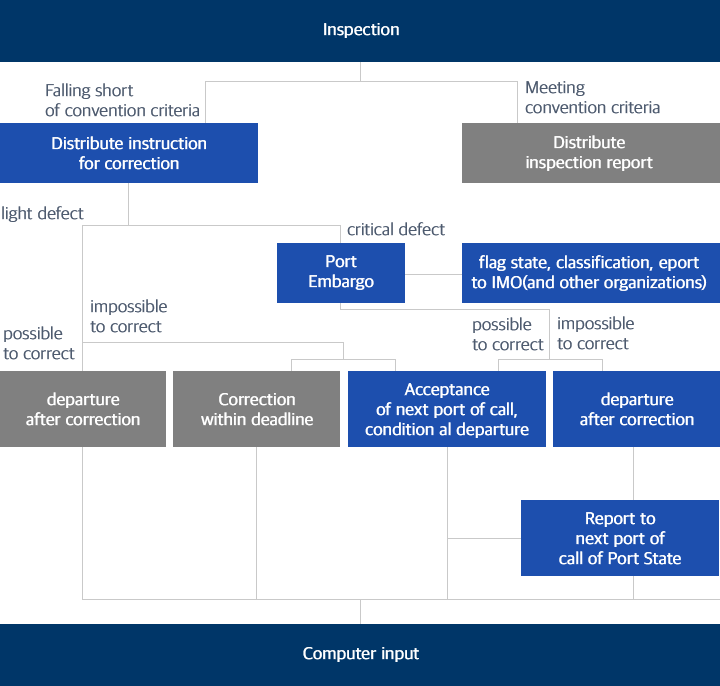Port State Control
Definition
PSC means that port authorities have the right to lay an embargo on a foreign ship if necessary after checking whether it complies with the safety criteria of international agreements.
Purpose
Marine accidents can cause a great loss of human life and property. In particular, the accident of a ship carrying dangerous goods such as oil can cause a devastating environmental catastrophe to the coastal countries.
In this context, the purpose of PSC is to protect human life, property, and maritime environment of a coastal country from a marine accident by a foreign ship falling short of safety criteria.
Background of PSC
Concerning the safety problem of international ships, the flag state principle, in which a country is responsible for the ship carrying its national flag, had been applied in general. Since World War 2, though, the transfer of a ship’s nationality has become popular in an effort to evade various kinds of taxes. Many shippers have transferred the nationality of their ships to that of emerging countries where the tough regulations of international agreements can be avoided. That is to say, the number of Flag of Convenience (FOC) vessels has increased. However, those emerging countries generally lack the responsibility to fulfill the flag state’s obligation to honor international agreements. Because of this, the FOC vessels were prone to neglecting the duty of controlling the ships of domestic nationality.
The increase of FOC vessels has led to the occurrence of serious maritime accidents, and it has raised the need for the international community to employ a new system that can mitigatethe weakness of flag state and increase marine safety. That is the system developed which authorizes the port states or coastal countries to control foreign ships.
Background of PSC
To respond to increasing concerns about maritime environment protection, many advanced countries have independently established regulations on the marine safety and security. In 1976, however, “Amococardis Accident” took place by a FOC vessel of Liberian nationality. The vessel was an oil tanker carrying approximately 220,000 tons of crude oil, but was stranded on the coast of France, spilling all its crude. This oil leakage brought about huge damage to the coastal countries. Triggered by that incident, many European countries jointly adopted the MOUof PSC in 1982.
Yearly Changes of Regulations
| Year | Accident | Legal Measures | Changes of Regulations |
|---|---|---|---|
| 1912 | Titanic sinking | SOLAS convention adoption in 1914 | Strengthening maritime safety criteria Strengthening flag state |
| 1967 | Torrey Canyon stranding | Intervention on the High Seas in Cases of Oil Pollution Casualties in 1969 CLC(International Convention on Civil Liability for Oil Pollution Damage) in 1969 |
Intervention on the accidents of the coastal countries |
| 1978 | Amococardis stranding | MARPOL in 1978 SOLAS Protocol in 1978 STCW in 1978 |
Strong legal response by IMO Emergence of PSC |
| 1987 | Herald of Free Enterprise sccident | Adoption of ISM (International Safety Management) Code | Strengthening safety check |
| 1990 | Scandinavian Star fire accident | ||
| 2001 | 9.11 terrorist attacks on the USA | Adoption of ISPS | Strengthening port and ship security |
Control Basis of PSC
International Convention- International Convention on Load Lines(LL 66)
- SOLAS and its 1978 Protocol(SOLAS74/78)
- International Convention for the Prevention of Marine Pollution from Ships and its 1978 Protocol(MARPOL 73/78)
- The International Convention on Standards of Training, Certification and Watch Keeping for Seafarers(STCW78/95)
- International Regulations for Preventing Collisions at Sea(COLEG 72)
- International Convention on Tonnage Measurement of Ships(ITC69)
- The Merchant Shipping (Minimum Standards) Convention(ILO 147)
- Law on ship safety, Law on ship, Law on seafarers, Law on ship’s crew, Law on marine traffic safety, Law on marine environment management
Inspection Procedure

Achievements of PSC
(Unit: a ship)
| Classigication | 2009 | 2010 | 2011 | 2012 | Remark | ||
|---|---|---|---|---|---|---|---|
| Classigication | 2009 | ||||||
| Numbers of ship in inspection | 351 | 391 | 401 | 350 | 355 | ||
| measures | Port Embargo | 34 | 28 | 10 | - | 12 | Defect rate 60.9% |
| Correction within deadline | 307 | 322 | 315 | - | 206 | ||
Achievements of PSC
Overseas site- imo : http://www.imo.org
- amsa : http://www.amsa.gov.au
- paris mou : http://www.parismou.org
- tokyo mou : http://www.tokyo-mou.org
- uscg : http://homeport.uscg.mil
- International Association of Classification Societies (IACS) : http://www.iacs.org.uk
- Baltic and International Maritime Conference (BIMCO) : https://www.bimco.org
- Korean Register of Shipping (KR) : http://www.krs.co.kr
- Korea Ship Safety Technology Authority (KST) : http://www.kst.or.kr
- Korea Shipowners’ Association : http://www.shipowners.or.kr


